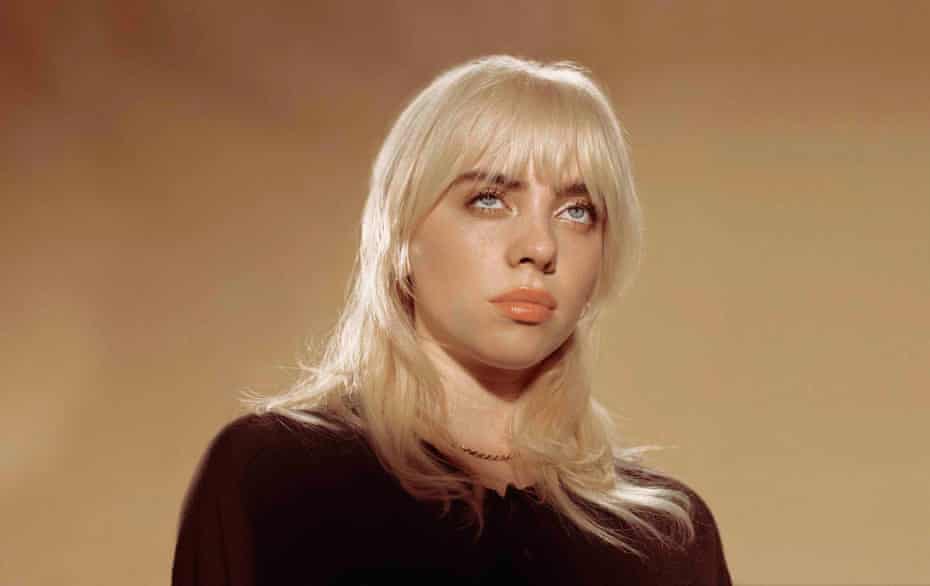The court of public opinion is never out of session!
When the creator in question is a young woman, the court of public opinion is always in session. Billie Eilish’s second album, Happier Than Ever, arrives amid a backlash to her success (seven Grammy nominations to date; Happier Than Ever has had more Apple Music listeners add it to their libraries before its release than any other album).
Eilish has been accused of queerbaiting and implicit racism in recent weeks. Previously, there was outrage over how she ditched her green hair and roomy hip-hop attire for platinum blond locks and even corsetry (for a British Vogue shot) in her debut, When We All Fall Asleep, Where Do We Go (2019).
With regard to her optics, Eilish has had to explain once again that she will present herself as she pleases; her 2020 broadside Not My Responsibility is reproduced on Happier Than Ever because it bears repeating.
OverHeated, a mordant track on the album, delves into the infamous paparazzo incident in which she was captured wearing a vest. The song’s direct message is hampered a little by a rhyme-association chorus that falls short of Eilish’s customary excellent standards. But it’s one of the film’s few flaws, as it’s a bold and elegant follow-up.
Usefully, Eilish’s new look – peak Hollywood bombshell weeping photogenically – is in keeping with her new music; there are some parallels with Lana Del Rey here, but very little overlap. Happier Than Ever doubles down on some of the deeply retro aesthetics of the signature sound refined by Eilish and her brother, Finneas O’Connell, which contrast hypermodern digitals with old-timey, satin-gown flourishes. It was no accident Eilish was tapped for a Bond theme.
The first installment of the Happier era was a classic.
The first instalment of the Happier era, last November’s My Future, combined a classic torch song with vintage funk-pop. Here, no fewer than five more tracks work in musical backward glances – bossa nova (the playful Bille Bossa Nova), Hawaiian breezes (the title track), or some classic, pre-pop vocalising. Everybody Dies is a very grown-up tune about death in which Eilish boggles at how anyone would want to be cryogenically preserved if everyone they loved was gone. The lovely Halley’s Comet, meanwhile, pairs church organ with a 60s bent and a waltz-time coda.

It helps that Eilish is both an old soul and a young woman coming into her sexuality, more able than before to spot lovers who want mirrors, not equals. Your Power, her song about abusive relationships, has been much discussed; a number of the tunes on Happier… are about wising up, processing past miscalculations or acknowledging traumatic events. These kiss-offs to sub-par men are poised and minxish: I Didn’t Change My Number and the title track are just two songs that take up the theme of the previously released Lost Cause.
“I’m getting better at admitting when I’m wrong,” Eilish sings on Getting Older. Last month, she apologised profusely for old footage in which she mouthed offensive lyrics written by Tyler, the Creator when she was younger (Tyler has mostly escaped censure for writing them). Earlier in June, the video for Lost Cause found her messing around with a bevy of girlfriends, spraying silly string and briefly twerking in their pants. Whether or not the video portrayed a rowdy sleepover or knowing disingenuousness remains for a jury of her peers to decide. The rest of Happier Than Ever tells a richly nuanced story about how human beings intersect.
On the acoustic guitar-led Male Fantasy, Eilish ponders the lies pornography tells, as well as the dislocation the singer feels when she can’t reconnect with an old friend. On Oxytocin, she gets raunchy, an innovation matched by an out-and-out dance track from Eilish and Finneas, in which her previous ASMR tendencies tip over into overt come-hither. She is, once again, a bad guy: wanting to do “bad things” to someone that others (including God, female in this cameo) wouldn’t approve of. Eilish yells at her lover to run away.
The O’Connell brothers are best recognised for their mastery of minimalism, which includes combining fairground melodies with creeping electronics and very occasionally switching from a saliva-wet whisper to a shout. That Oxytocin shout – and the title track’s crescendo – have a big impact.
On the title track, Eilish tosses out an inattentive lover with a none-more-2021 rant about how she never stooped to dissing her ex on social media. Two-thirds of the way through, the tune becomes cranked and saturated. This rockist squall is a departure for O’Connell’s sound – and a rare moment of catharsis for Eilish, a master of underplayed restraint who knows how to keep her powder dry.
Also read: International Friendship Day 2021!
Follow us on Twitter | Facebook | Linkedin | Instagram |










